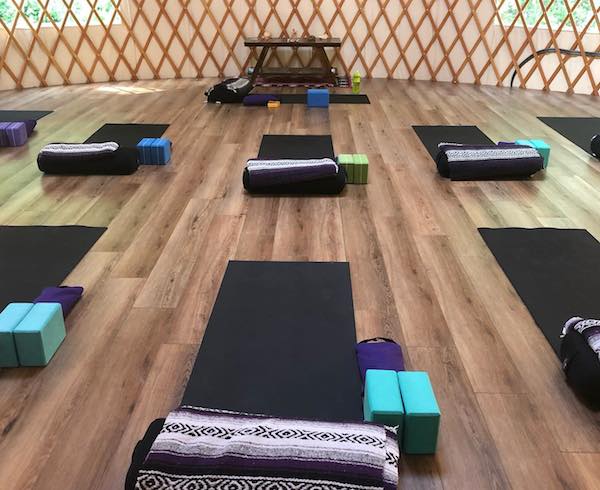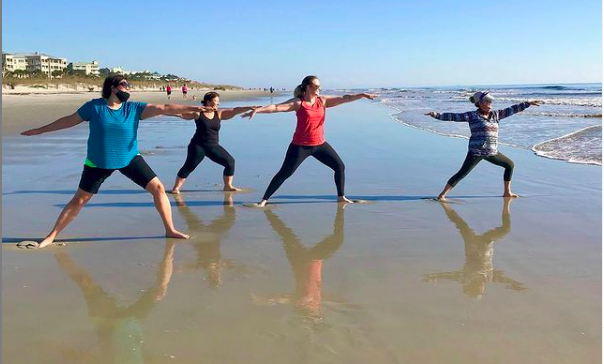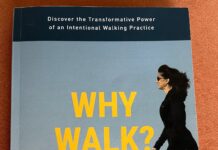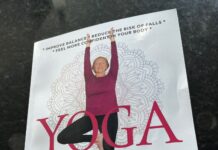By Erin Nicole Davis
If there was ever a time to discover or rediscover yoga – in all of its restorative, balancing (literally and figuratively), and uplifting glory – it’s right now, as we begin what will surely be a much better New Year.
Of course, the countless benefits of yoga are not a recent discovery. But, during a time of global crisis and uncertainty, yoga’s union of the body, mind, and spirit is particularly appreciated and – frankly – needed.
“Yoga brings much needed peace, and makes a big difference in one’s behavior, thought patterns, and attitude. I would say yoga is almost indispensable especially in the current times, when we are going through so much uncertainty and stress around us,” says Poornima Sharma, Faculty & Supervisor, Art of Living Programs at North Carolina’s invigorating Art of Living Retreat Center.
“We are constantly living in a fight or flight mode, and that triggers stress at the level of the mind and the body. If one wants to be sane, sensitive, sensible, strong and intuitive, practicing yoga can be very instrumental in healing the mind and body.”
Here are seven reasons why yoga is more essential than ever right now.
#1 Yoga Strengthens the Body
At a time when many of us have been confined to the home for months, keeping in fine physical form needs to be a priority. “Yoga is a great way to strengthen while you lengthen,” says David Chesworth, Fitness Director and Wellness Coach, at South Carolina’s Hilton Head Health. “Not only does yoga help to fight off the stiffness and aches that tight muscles present to the joints, it’s also a great way to increase your strength to body-weight ratio. In other words, balance, coordination, and everyday movements have an opportunity to be changed for the better with a regular yoga practice.” Furthermore, says Chesworth, if yoga is a staple in your lifestyle, it can even help to fight against – and even reverse – the effects of osteoporosis (fragile bones) over the course of multiple years of consistent practice two to three days per week.

#2 Yoga Calms the Mind
At a time of anxiety-inducing headlines and perpetual pandemic-related uncertainty, yoga can instil a sense of calm and centering. “There’s more to yoga than moving your body through the poses,” says Katie Rinaldi, Yoga Instructor at Skyterra Wellness Retreat in North Carolina. “The first step in Yoga is union of the physical, physiological and psychological into one to provide 100 percent functional efficiency of the body, breath and mind. When this union occurs, the mind becomes still, calm and quiet which allows the individual to start to connect to and feel the presence of something deeper within.”
#3 Yoga Improves Circulation
Now that most of us are out and about a lot less than we used to be due to COVID-19 restrictions, we can use all the help we can get in the circulation department. “Improved physical mobility is a strong contributor to improved blood flow’ conversely, tight muscles and connective tissue can contribute to poor circulation throughout the body,” says Chesworth. “The benefits of improving physical mobility not only improve quality of life from a movement perspective, but also by improving circulation and therefore function to the major organs of the body, such as the brain.”

#4 Yoga Boosts Your Mental Health
Anyone who has practiced yoga knows that a quality yoga practice leaves you simply feeling better – mental health-wise – no matter how crazy the outside world may seem. “We can individualize yoga techniques to produce the desired effect needed to work directly with mental-health related issues, such as anxiety, depression, and trauma,” says Rinaodi. “For example, I tend to see within students who suffer from depression and/or trauma that their physical body tends to be hunched forward as a natural instinct of the body to protect. This can cause constriction in the front side of the body, more specifically in the area of the chest/heart, which is the area of the physiological responsible for respiratory and cardiac functions, as well as emotions. As a result, students can have constricted breath patterns, imbalance in emotions (low energy/lethargic/low self-esteem, etc.), as well as tightness in the chest/upper back/neck/shoulders on the level of the physical body.”
Through specific yoga postures, however, Rinaodi says it’s possible to relieve the tension in the upper back, neck, and shoulder region, as well as focus on back-arches to open the space of the chest from being slouched forward. “This can open the heart space to help balance emotions/build self-confidence, as well as improve functionality of the respiratory and cardiac systems,” she says. “Additionally, through focus on the inhalation, we can help to increase the breath within the body to help create a longer, fuller, deeper breath as well as allow the student to experience the energizing/invigorating effects of the inhalation breath that will counteract.”

#5 Yoga Helps to Consolidate and Channel Energy
Expanding on the plentiful mental health benefits, yoga also helps effectively channel energy. “When the water flows outside its banks, it can create a flood. But when the water flows within its banks, it can bring prosperity,” says Sharma. “Similarly, when your emotions get flooded everywhere, the mind is a mess. But when the emotions flow intensely in one direction, it helps in accomplishing what one wants to with clarity, focus and attention. Yogic practices do exactly that. It allows one to have a direction so we are all not messed up.”
#6 Yoga Aids the Aging Process
Yoga is also known for its anti-aging properties. With activities for older adults at a standstill throughout most of North America, this is more important than ever. “As the aging process happens, and adults start experiencing changes within their own constitution, yoga can offer an opportunity to move away from a focus on a physical yoga practice and start to move their focus to one of meditation, deep introspection, and self-study to help accept the changes happening within their body, mind and intellect,” says Rinaodi. “Yoga can also help to alleviate and/or manage symptoms of physical strain, degeneration, disease and illness that can start to occur in adults as early as the age of 25 or 30.”
#7 Yoga Helps with Rest and Rejuvenation
If you’re having trouble sleeping these days, you’re not alone. Times of unrest can and do affect sleep. Yoga can improve sleep, especially for those who suffer from insomnia. In addition to rejuvenating the body, it also refreshes the mind. “The mindfulness and meditative focus that yoga brings to the practice is an excellent way to give your brain a break from the daily stressors of life – or perhaps the ‘unprecedented’ stressors of 2020 –which gives the brain an opportunity to, for lack of a better term, ‘breathe,’ says Chesworth. “ Just like a muscle, the brain needs rest and recovery breaks from stressors in order to improve, adapt and deal with that stressor more effectively in the future.”
~ ~ ~ ~ ~
Erin Nicole Davis is a Toronto-based freelance writer and regular contributor to Travel to Wellness. Follow her on Instagram.











